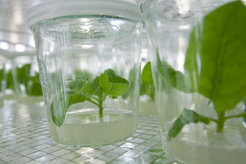Organelle Biology and Biotechnology

We explore diverse aspects of plastid biology, ranging from the systematic analysis of gene expression and its regulation at all levels to fundamental questions of genome evolution and new biotechnological applications of plastid genome engineering.
We develop methods for the genome-wide analysis of organellar gene expression and novel tools and technologies for the targeted manipulation of organellar genes and genomes. We combine these with a wide spectrum of cutting-edge genetic, biochemical and physiological techniques to understand, and ultimately control, the functioning of the plastid in its interaction with the nucleus and the mitochondria and in response to changing environmental conditions and developmental programs. Our favorite model organisms include various higher plant species (tobacco, Arabidopsis, tomato, sugarcane, maize) and the unicellular green alga Chlamydomonas reinhardtii.
Research in the group currently focuses on four main areas that are highly interconnected:
- Analysis of plastid gene expression at all levels, including transcription, RNA processing, translation, protein stability and protein complex assembly (e.g., Nature Struct. Mol. Biol. 2008; Plant Cell 2008a,b; Plant Cell 2011),
- Development of new tools and technologies for transgenic research in plant cell organelles (e.g., PNAS 2010; Curr. Op. Biotechnol. 2007),
- Exploration of novel biotechnological applications of plastid genome transformation in metabolic engineering, molecular farming and resistance engineering (e.g., PNAS 2009; Trends Biotechnol. 2010), and
- Experimental genome evolution (e.g., Science 2009; BioEssays 2008; Trends Plant Sci. 2010; PNAS 2012; Curr. Biol. 2012)


